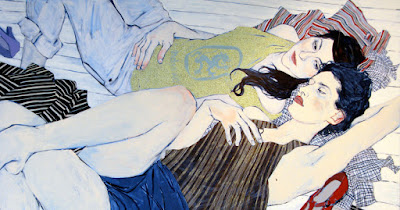“I don’t like her,” I said to my husband, Pete, then I pretended to pull out my hair.
To be fair, at this particular moment in my life — anxious, lonely, bored in my marriage, and up to my eyeballs in kids — I didn’t like anyone, especially myself.
On the surface, I had most of what I’d always wanted: a husband, a home, two healthy kids, and after a decade of professional frustration and failure, something that could pass as a career. I had the things I’d craved so deeply when I was younger, the things that had seemed impossibly out of reach in my early 20s when I’d had not much more to ground my life than a handful of intimate friendships with other women. And yet, as I prepared to leave for the conference, I knew that something was missing. (...)
I’ve done it all my life. Call it oversharing. Call it lack of boundaries. Call it projection or a profound impatience for the normal social mores that make deep-friendship formation so excruciatingly arduous. It doesn’t matter what you call it; the trait remains — the tendency to find one person in a group, one person at work, at a party, on a trip, at a wedding, or anywhere at all. I find one person, and that is my person. We are on the same wavelength, I decide, and then I give up giving a shit about everyone else.There are times when I think I’m an intimacy addict. This is what my husband sensed and feared. (...)
If I mention to a friend over lunch this notion that I might be an intimacy addict, she leans closer and lowers her voice. “Really? I had no idea. You haven’t told me about this!” I can imagine what she’s imagining, a series of illicit hotel encounters or elaborate schemes to find a bed without producing a credit-card receipt. The word intimacy sounds seedy, or worse, sentimental — it’s a word used to sell lingerie or Viagra. It’s a word therapists use when they don’t want to employ the more colloquial term: fucking. But this semantic baggage seems funny and ill-timed to me. For both the young and old, gay and straight, partnered and unattached, it has never been more socially acceptable to have sex with a person you don’t know or like, much less someone with whom you don’t feel intimacy.
To be intimate with a person literally means to feel closeness with that person, to feel familiar, attached, in rapport. Vivian Gornick describes it as an alignment of temperament, “the thing that makes someone respond instinctively with an appreciative ‘I know just what you mean,’” rather than the argumentative What do you mean by that? She describes it as the feeling that “You are me, I am you, it is our obligation to save each other. We are a pair of solitary travelers slogging through the country of our lives.” Until I met my husband, I can say with a high degree of confidence that none of the men with whom I had sex felt any desire to save me, to be me, or to become my fellow traveler. They were far more likely to demand what I meant by something than to say they knew just what I meant.
With my husband, it was different. He got me. He loved me. He saw me and accepted me for the feisty, neurotic, absentminded, contrarian chick I was. We started out on our married life together locked arm-in-arm. We were buddies and partners, and together we tackled the project of figuring out how to live, how to build a family. But as the years passed, as we got deeper and deeper into “the kid thing,” I could feel the space between us growing, the energy seeping, our empathy going toward our kids instead of each other. Now, there were moments when even my husband, toward whom I felt an unsurpassable kinship and love, seemed to have no idea what I meant when I was at my most agitated or enthralled.
Our emotional orbits intersected in a thousand places every day but never exactly aligned. There was a space between us as we moved through life. Sometimes I think it is this space that allows us to stay married. Sometimes I think it is this space that makes me stay hungry for something else.
by Kim Brooks, The Cut | Read more:
Image: Hope Gangloff, Clothes Swap, Brooklyn, 2008